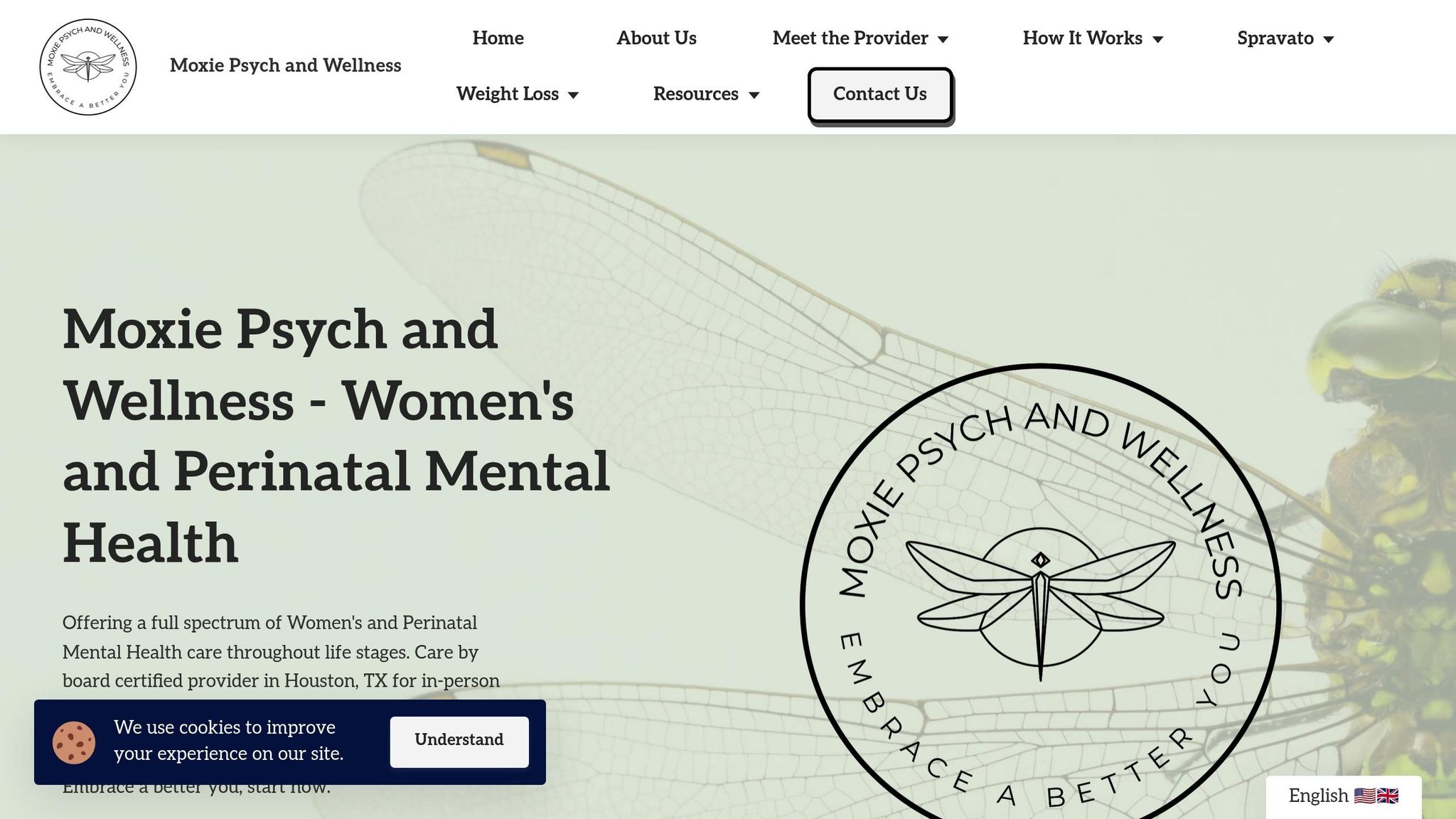Dialectical Behavior Therapy (DBT) is a practical, skills-based approach to help manage emotions and reduce harmful behaviors, making it a powerful tool for eating disorder recovery. Eating disorders often stem from emotional struggles like anxiety, shame, or trauma, and DBT focuses on addressing these underlying issues. Here's a quick breakdown of how DBT can support recovery:
- Mindfulness: Teaches awareness of thoughts and feelings to interrupt harmful eating patterns.
- Distress Tolerance: Offers immediate coping strategies for overwhelming emotions without resorting to disordered behaviors.
- Emotion Regulation: Helps identify, understand, and manage emotions effectively.
- Interpersonal Effectiveness: Improves communication, sets boundaries, and strengthens relationships to reduce emotional triggers.
DBT's structured methods, such as the TIPP technique for distress relief and the PLEASE framework for self-care, are actionable tools that support emotional and behavioral recovery. Research highlights DBT's success in reducing binge eating, purging, and emotional distress, especially when combined with professional guidance tailored to individual needs. Recovery is about steady practice, and DBT provides the skills needed to navigate challenges and build healthier habits.
From Crisis to Calm with TIPP Skills | Eating Disorder Skills
Core DBT Skills for Managing Emotions
Dialectical Behavior Therapy (DBT) breaks its approach into four main skill modules, each addressing different emotional and behavioral challenges. These modules work together to provide tools for managing the intense emotions that often fuel eating disorder behaviors. Below, we’ll explore each core skill and how it can support emotional recovery.
Mindfulness
Mindfulness is the cornerstone of DBT, helping you observe your thoughts, emotions, and physical sensations without reacting impulsively. This skill is especially valuable in eating disorder recovery, as it creates a pause between emotional triggers and harmful behaviors. Instead of automatically turning to restrictive eating or bingeing when distressed, mindfulness encourages you to stop and choose a healthier response.
The "observe, describe, participate" framework is key here:
- Observe: Notice what’s happening in your mind and body without judgment or trying to change it.
- Describe: Put your observations into neutral words, like saying, “I’m having the thought that I’m not good enough,” instead of accepting it as fact.
- Participate: Fully engage in the present moment, rather than getting caught up in anxious thoughts about food or body image.
Another important concept is wise mind, which balances emotional and rational thinking. Emotional mind might push you toward behaviors like bingeing out of shame or anxiety, while rational mind might enforce rigid food rules. Wise mind integrates both, guiding you to decisions that respect your emotions while supporting recovery.
Mindfulness can also reshape your relationship with food. By eating with awareness - paying attention to hunger cues, taste, texture, and emotions - you can break automatic eating patterns and make more intentional choices.
Distress Tolerance
When emotions feel overwhelming, distress tolerance skills offer immediate ways to cope without resorting to harmful behaviors. For those recovering from eating disorders, these techniques provide alternatives to using food, restriction, or purging as emotional outlets.
The TIPP method offers quick relief:
- Temperature: Use cold water on your face or hold ice cubes to calm your nervous system.
- Intense exercise: A short burst of activity, like jumping jacks or running up stairs, can release pent-up energy.
- Paced breathing: Slow your exhale to be longer than your inhale to activate relaxation.
- Paired muscle relaxation: Tense and release muscle groups to ease physical tension.
Another helpful tool is ACCEPTS:
- Engage in Activities like calling a friend or doing a hobby.
- Contribute by helping someone else.
- Use Comparisons to remind yourself of challenges you’ve already overcome.
- Shift your Emotions by listening to upbeat music or watching something funny.
- Push away distressing thoughts temporarily to focus on something else.
- Redirect your Thoughts by doing puzzles or reading.
- Use your senses to experience calming Sensations, like wrapping up in a soft blanket or lighting a scented candle.
Radical acceptance is another cornerstone of distress tolerance. It’s about acknowledging reality as it is, even when it’s painful, instead of resisting or avoiding it through disordered behaviors. This doesn’t mean you approve of the situation - it just means letting go of the struggle to change what can’t be changed.
Emotion Regulation
For many, managing emotions feels like an uphill battle. Emotion regulation skills help you identify, understand, and handle emotions without turning to disordered eating.
The first step is emotion identification - learning to name what you’re feeling. Instead of labeling everything as "stress", you might realize it’s a mix of anxiety, sadness, and frustration. Pinpointing emotions makes it easier to address them directly.
Opposite action is another powerful tool. If shame makes you want to isolate and skip a meal, opposite action might mean reaching out to a friend and eating together. If anxiety urges you to avoid a social event with food, opposite action could mean attending and practicing mindfulness while there.
The PLEASE framework supports emotional stability through self-care:
- Treat PhysicaL illness promptly.
- Balance Eating by sticking to a consistent meal plan.
- Avoid mood-Altering substances that can destabilize emotions.
- Balance Sleep with regular sleep schedules.
- Get Exercise in a way that supports, not punishes, your body.
Engaging in mastery activities - like learning a new skill or completing a creative project - can also help. These activities provide a sense of accomplishment and offer healthier sources of self-worth beyond appearance or eating habits.
Interpersonal Effectiveness
Strong communication skills not only improve relationships but also reduce food-related triggers. DBT’s interpersonal effectiveness tools help you express your needs, maintain self-respect, and build a supportive network.
The DEAR MAN strategy can guide effective communication:
- Describe the situation objectively without blame.
- Express your feelings clearly.
- Assert what you want or need.
- Reward the other person by explaining how meeting your request benefits them or the relationship.
- Mindful focus helps you stay on track during the conversation.
- Appear confident in your tone and body language.
- Negotiate to find a solution that works for everyone.
For maintaining relationships during tough conversations, GIVE skills are invaluable:
- Be Gentle - avoid attacking or judging.
- Show Interest by actively listening and asking questions.
- Validate the other person’s feelings, even if you disagree.
- Use an Easy manner to stay relaxed and approachable.
To preserve self-respect, FAST skills come into play:
- Be Fair to yourself and others.
- Avoid unnecessary Apologies that weaken your position.
- Stick to values by staying true to your principles.
- Be Truthful - don’t exaggerate or manipulate.
These tools are especially helpful when eating disorders have strained relationships. By learning to express emotions and set boundaries directly, you can reduce the need to use food as a way to communicate or cope. They also help you address comments or behaviors from others that might trigger symptoms, creating a safer and more supportive environment for recovery.
How to Use DBT Skills in Daily Recovery
Incorporating DBT skills into your daily routine can make a significant difference in your recovery journey. These techniques build on mindfulness, distress tolerance, and emotion regulation, offering practical tools to navigate intense emotions and old habits. The secret lies in consistent practice - both for everyday maintenance and during moments of crisis.
TIPP for Managing Acute Distress
When emotions hit hard and the urge to fall back into disordered behaviors arises, TIPP skills can help you regain control. These techniques work by shifting your body's state, allowing you to think more clearly and make healthier choices.
- Temperature: Use cold sensations to calm overwhelming emotions. Splash cold water on your face, hold an ice cube, or take a cold shower. The sudden chill can help ground you.
- Intense Exercise: Engage in short bursts of physical activity - 5 to 10 minutes is enough. Try jumping jacks, running up and down stairs, or even wall push-ups to release pent-up energy.
- Paced Breathing: Slow, deliberate breathing can reduce your heart rate. For example, inhale for 4 counts, hold for 4, and exhale for 6 to 8 counts. Practicing this regularly makes it easier to rely on during stressful moments.
- Progressive Muscle Relaxation: Ease anxiety by tensing and relaxing your muscles. Start with your toes, tense each group for 5 seconds, then release. This process helps reduce tension and increases body awareness.
While TIPP skills are great for immediate relief, it’s also important to address emotional triggers in deeper, more lasting ways.
Using Opposite Action and Radical Acceptance
Two essential DBT strategies for eating disorder recovery are opposite action and radical acceptance. These tools can disrupt the cycle where intense emotions lead to harmful behaviors.
- Opposite Action: This strategy involves doing the opposite of what your emotions push you toward. For instance, if you feel like isolating, make an effort to reach out to someone instead. It’s a way to break the grip of negative urges.
- Radical Acceptance: This involves acknowledging tough realities without resisting them. Accept that recovery can be uncomfortable, that your body is undergoing changes, and that you can’t control every aspect of the process. Radical acceptance doesn’t mean you have to like these realities - it’s about saving your energy for actions that truly support your healing. Shift thoughts like "This shouldn’t happen" to "This is hard, but I can handle it."
Both skills take time to master. Start small - use opposite action for minor urges and practice radical acceptance with everyday frustrations. Over time, these strategies can help you tackle bigger challenges and stay on track in your recovery.
sbb-itb-3d00657
Research on DBT for Eating Disorder Recovery
Studies show that Dialectical Behavior Therapy (DBT) not only helps improve eating behaviors but also plays a key role in managing emotions - an essential part of the recovery process. By focusing on skills like emotional regulation and distress tolerance, DBT can reduce harmful eating patterns while boosting emotional well-being. Research continues to highlight DBT's effectiveness, bridging the gap between theory and practical recovery outcomes.
Study Results on DBT for Eating Disorders
Research consistently shows that DBT leads to improvements in both eating habits and emotional health, particularly for conditions like bulimia nervosa and binge eating disorder. For instance, a study published in a top psychiatry journal found that participants in structured DBT programs experienced fewer binge and purge episodes. Other research indicates that individuals with binge eating disorder often see early reductions in binge episodes. These participants also report feeling more in control of their emotions and better equipped to handle stress without relying on food.
Long-term studies tracking women in DBT programs reveal better management of emotions like anger, sadness, and anxiety, highlighting DBT's role in building emotional resilience. Follow-up research further shows that many participants maintain their recovery progress over time, reinforcing the therapy's lasting benefits.
Trauma-Informed and Culturally Sensitive Approaches
One of DBT's strengths is its ability to adapt to individual needs, particularly through trauma-informed and culturally sensitive approaches. Research underscores that many women with eating disorders have experienced trauma, such as childhood abuse or sexual assault. By emphasizing skills like distress tolerance and emotional regulation, DBT directly addresses trauma-related triggers often tied to eating disorders.
Culturally adapted DBT programs also show promising results. For example, studies reveal strong outcomes among Latina women, helping rebuild trust in therapy and improving recovery rates. Group DBT sessions further enhance the process by creating a sense of community, reducing feelings of isolation, and reinforcing recovery efforts.
The flexibility of DBT allows it to meet the diverse needs of individuals across different life stages and cultural backgrounds, making it a versatile and effective option for many on their recovery journey.
Getting Support for Eating Disorder Recovery
Recovering from an eating disorder often requires professional help to ensure lasting progress. Combining professional care with Dialectical Behavior Therapy (DBT) can provide a more comprehensive approach to recovery. While DBT equips you with essential coping tools, professional support tailors these skills to your individual journey.
Finding Professional Help
Professional guidance can deepen the foundation built through DBT by addressing the emotional and behavioral patterns tied to eating disorders. It's important to seek out providers who specialize in understanding the connection between emotions and eating habits. These experts can help fine-tune the strategies you've learned in DBT to better suit your specific needs.
A good starting point is a psychiatric evaluation, which can help uncover underlying issues like anxiety or depression that often contribute to disordered eating. This step is crucial for creating a treatment plan that targets both the eating disorder and any coexisting conditions.
Flexible treatment options, such as virtual evaluations, make it easier to fit care into your life. These remote options provide privacy and convenience without compromising the quality of care. Additionally, a psychiatrist can assess whether medication might complement your treatment, especially if anxiety or depression is part of the picture.
Look for providers who offer personalized treatment plans rather than generic solutions. Each person's experience with an eating disorder is shaped by their background, family dynamics, and personal triggers. Effective care takes these factors into account, creating a plan that aligns with your unique story.
How Moxie Psych and Wellness Can Help

Moxie Psych and Wellness specializes in women's mental health, including the challenges of eating disorders. They offer both in-person and virtual evaluations, providing personalized care that fits your needs. Their services include medication management and specialized support for perinatal mental health, ensuring a holistic approach to treatment.
In addition to addressing eating disorders, Moxie Psych and Wellness provides evidence-based care for conditions like depression, anxiety, mood disorders, and ADHD. This integrated approach allows you to tackle multiple aspects of your mental health within a single, supportive environment.
Their concierge-level care ensures that your treatment evolves with your needs, offering consistent coordination and attentive support throughout your recovery journey.
Conclusion: Using DBT Skills for Emotional Recovery
Dialectical Behavior Therapy (DBT) offers practical tools to help you manage emotions and support your journey toward eating disorder recovery. These skills - mindfulness, distress tolerance, emotion regulation, and interpersonal effectiveness - are all about breaking the cycle of disordered behaviors and building healthier patterns.
Recovery doesn’t mean mastering these techniques overnight. It’s about steady practice, even when it feels uncomfortable or challenging. Each time you apply strategies like opposite action or radical acceptance, you’re strengthening your ability to handle distress and move forward.
Research shows that DBT can significantly reduce eating disorder symptoms, especially when paired with professional support. A mental health professional can adapt DBT techniques to suit your unique needs, whether you’re working through binge eating, restrictive behaviors, or struggles with body image.
Your emotional health is just as important as your physical well-being. By combining DBT strategies with expert care, you’re setting the stage for a recovery that lasts.
FAQs
How can DBT skills help manage emotions during eating disorder recovery?
Dialectical Behavior Therapy (DBT) plays a key role in helping individuals manage emotions during eating disorder recovery. It provides practical skills in emotion regulation, distress tolerance, and mindfulness, which are crucial for understanding and addressing emotional challenges. These skills empower individuals to recognize their feelings, reduce impulsive actions like binge eating or purging, and adopt healthier ways to cope.
By learning how to handle intense emotions, individuals can better manage triggers and stay committed to their recovery journey. DBT helps create a sense of balance and control, laying the groundwork for emotional resilience and supporting lasting recovery from eating disorders.
How can DBT skills be used daily to support recovery from an eating disorder?
Incorporating Dialectical Behavior Therapy (DBT) skills into your everyday routine can offer meaningful support on the path to recovering from an eating disorder. A great starting point is mindfulness, which helps you stay grounded in the present and manage emotional reactions. This could be as simple as practicing deep breathing, doing grounding exercises, or embracing mindful eating - focusing on the flavors, textures, and sensations of your food.
When emotions feel overwhelming, distress tolerance techniques can be a lifeline. These might include self-soothing through comforting activities, distracting yourself with something engaging, or enjoying positive sensory experiences like listening to calming music or holding a warm cup of tea. These approaches can help you ride out intense feelings without turning to harmful habits.
Another key set of tools involves emotion regulation skills. Start by identifying and naming what you're feeling - sometimes just putting a name to an emotion can reduce its intensity. You can also try the "opposite action" technique, which involves doing the opposite of what your urges might tell you, especially when those urges conflict with your recovery goals. Over time, these strategies can help you develop stronger emotional resilience and healthier ways to cope, creating a foundation for lasting recovery and stability.
Can Dialectical Behavior Therapy (DBT) help with both trauma and eating disorder recovery?
Dialectical Behavior Therapy (DBT) can be a powerful tool for those dealing with both trauma and an eating disorder. Its emphasis on emotion regulation, distress tolerance, and interpersonal effectiveness equips individuals with practical strategies to manage the intense emotions often tied to these conditions. By tackling emotional dysregulation, DBT works to reduce behaviors associated with disordered eating and trauma-related reactions.
In some cases, pairing DBT with trauma-focused therapies like Eye Movement Desensitization and Reprocessing (EMDR) can enhance the healing process. This combination addresses the root causes of trauma while fostering healthier coping skills. Together, these methods have shown encouraging results in improving emotional health and supporting lasting recovery.



